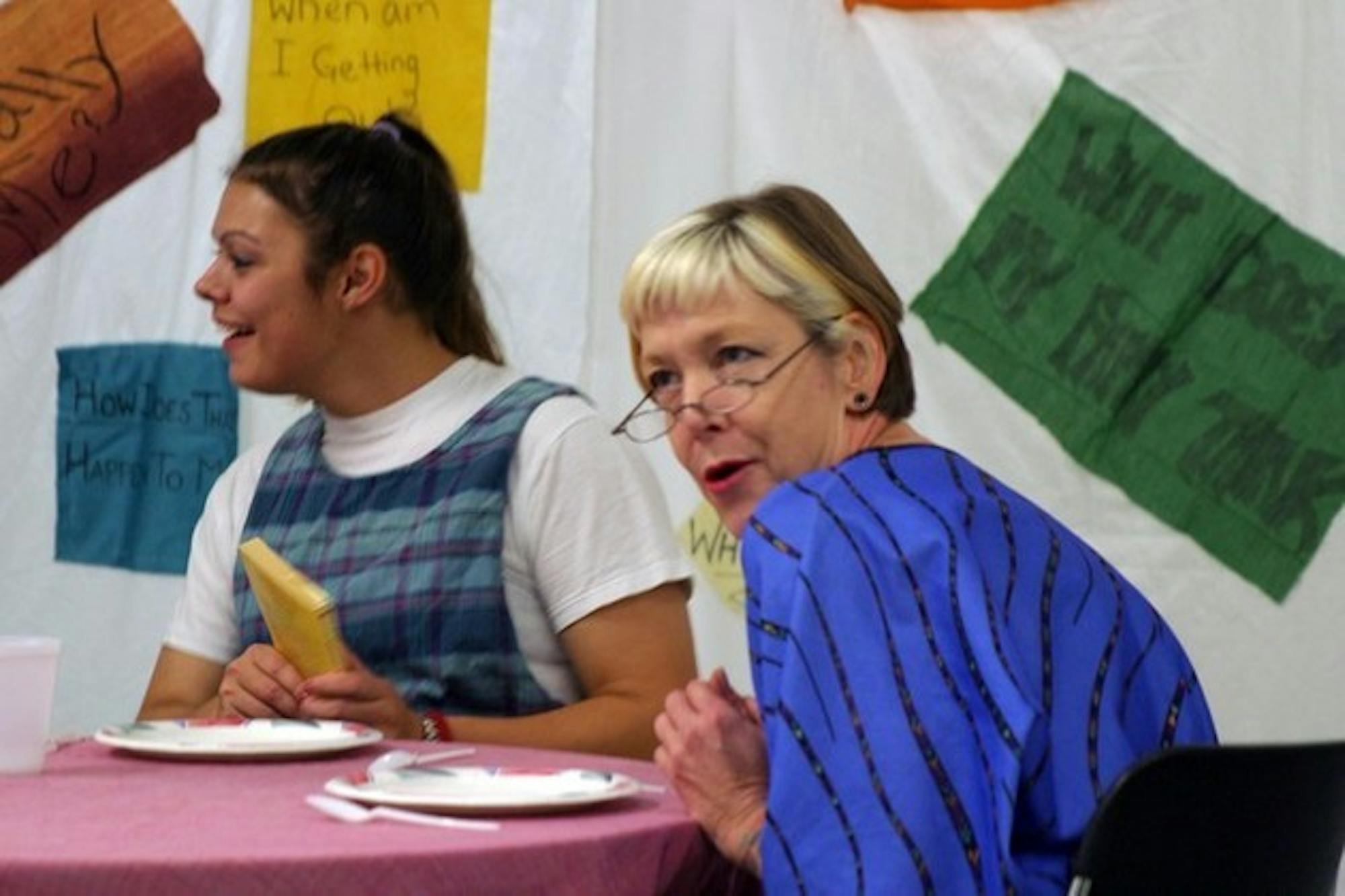The student and inmate actors gave the audiences vivid snapshots of the sometimes harsh realities of the inmates' former life situations. One story showed two children furiously playing with their video game controllers while a livid father marched in wondering why dinner wasn't ready yet. The alcoholic mother poorly attempted to cook a dinner while one of her children said, "Mom, the smoke detector isn't a timer."
This term, Daniella Sloane '10 and Christina Stoltz '06 worked with the inmates to understand and act out these vivid experiences.
Sloane said that the experience brought the students and inmates together.
"We found so many similarities between them and us that at the end, there was no 'them' and 'us' -- there was a 'we.' They helped me self-actualize," Sloane said.
According to Pati Hernandez, the facilitator of the program, many of the women in this prison are repeat offenders stuck in a cycle of exiting and entering jail again, which, Hernandez contends, makes it apparent that these inmates' corrections system experiences failed to improve their situations.
"Many of these people do not have a place to go. They have nothing. They are very abandoned, socially speaking, so what do they do if they really want to change after prison? Do we really give them those chances? Not really," Hernandez said.
She believes that society should be a better provider once prisoners leave jail so they can break out of a pattern of cyclically repeating offenses.
"We should have halfway housing -- we should have a lot more state reentry programs. They need places to go after they are out of corrections," Hernandez said.
However, not all those in jail are from poor or under-educated backgrounds. There are several college graduates in the prison, according to inmate Jessie Marshal.
To present this fact, the second character profiled was part of a wealthy family. In one scene, someone that the family considered an uncle sexually abused the female character, but the family did not notice the abuse.
The girl, after seeking solace with a group of unruly friends, was convicted of aiding and abetting a murder that these friends committed.
"No matter who you are, it's all about choice. The good choices, the bad choices and what happens afterwards," Marshal said.
Norma, an inmate member of the audience on Thursday who identified herself as a former drug addict, said that the scene of an abusive family member and an alcoholic and neglectful mother directly portrayed scenes from her own life.
"The play knocks down the walls of the facade behind which we like to hide everything. Dartmouth students have a lot to learn from that openness," Natalie Koch '07 said.
Other students gained insight into what it means to be a prisoner.
"The play taught me what it's like to be on the other side of, literally, the fence," Luis Dinnella-Borrego '07, another audience member, said.
After the play, the women divulged their anxieties to the audience in five-minute testimonies.
"I'm tired of people projecting judgments and biases on me," Marshal said.
Students, community members and inmates who attended the event agreed that the women in the play were genuine and honest.
"I would never have the balls to get up there and do what you guys did," one inmate in the audience said.
During this project, women struggle to achieve a common goal by learning to work with a group of people, some of whom they may not like, Hernandez said.
"This play gives them real power. It gives them a goal," Amanda Rosenblum '07, who was involved in a similar production at Windsor last spring, said.
The experience of working with inmates impacted Rosenblum more than any other program in which she has participated in her life, she said.
"They have great knowledge of what it is to be on the dark side, to be abandoned, and they are a great source to us to find out what we are doing wrong in society," Hernandez said.
Hernandez strongly advocates for programs such as her theater program to increase exposure between the outside world and inmates.
"This [program] allows access. We can't hide corrections under the rug because it is a part of our social dynamic," Hernandez said.
Hernandez volunteers for this program, which she usually funds independently. The program constantly seeks monetary donations as well as materials, but most of the money for the program comes from Hernandez's pocket. Currently, the program seeks to obtain a computer.
The increasing amount of privatization in corrections facilities also presents a massive conflict of interest in Hernandez's eyes. Corrections Corporation of America is the fifth largest corrections system in the nation, behind only the federal government and three states, according to the CCA website.
"[Privatization] is completely against the principle of corrections. There is a conflict of interests. If you have a private business, you need inmates," Hernandez said.




